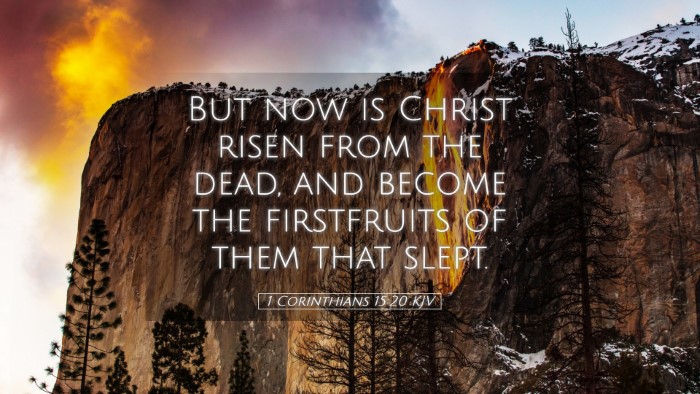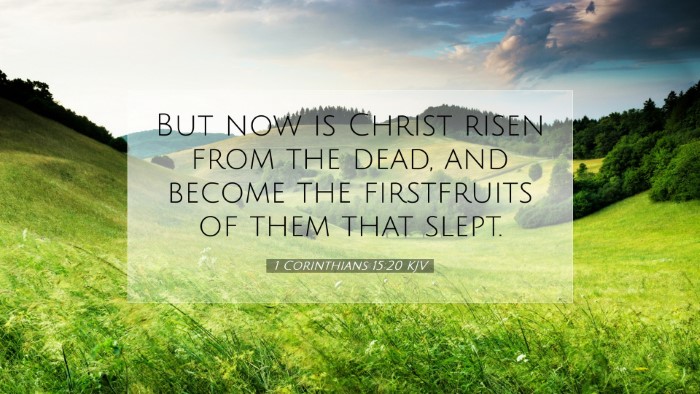Commentary on 1 Corinthians 15:20
Verse: "But now is Christ risen from the dead, and become the firstfruits of them that slept."
Introduction
The resurrection of Jesus Christ stands as a cornerstone of Christian faith. In this verse, the Apostle Paul emphasizes the significance of Christ's resurrection, positioning it as a pivotal event in redemptive history. This commentary synthesizes insights from notable public domain scholars such as Matthew Henry, Albert Barnes, and Adam Clarke to explore the profound implications of this declaration.
Contextual Background
1 Corinthians 15 is a key chapter addressing misconceptions about the resurrection among the Corinthians. Paul aims to clarify its importance, demonstrating that Christ’s resurrection is not merely an event but the foundation for the hope of all believers. Understanding the cultural and spiritual milieu of the Corinthian church sheds light on the Apostle's urgency in affirming this truth.
1. Analysis of Key Phrases
- "But now": Paul uses this phrase to pivot from previous discussions about death and resurrection. It signifies a transition from despair to hope, marking the resurrection as a definitive moment in history.
- "Christ risen from the dead": This declaration asserts the truth of Jesus’ resurrection as a historical and theological fact, crucial for the Christian faith. It highlights the power of God that raised Christ, affirming His divine identity.
- "Firstfruits of them that slept": This term draws from agricultural imagery. In the Old Testament, the firstfruits were the initial yield of the harvest, dedicated to God. Paul correlates Christ's resurrection as the first of many resurrections that will follow, providing believers a guarantee of their future hope.
2. Theological Implications
The resurrection is fundamental to Christian doctrine. Paul’s assertion here confirms three main theological implications:
- Victory over Death: Christ's resurrection signifies His triumph over sin and death. As Barns notes, "Without resurrection, the faith of the disciples would have been shattered." The assurance of life after death is rooted in Christ’s victory.
- Hope for Believers: Clarke emphasizes that believers share in this resurrection. "As Christ was raised, so shall they be raised." This hope transforms the believer's perspective on life and death, prompting a lifestyle that anticipates eternal fellowship with God.
- Foundation of Faith: Henry asserts that the resurrection establishes the gospel's truth. The resurrection is not merely an event in isolation but a central theme that validates the entire Christian faith. Without it, the Christian message falls flat.
3. Christ as the Firstfruits
The term "firstfruits" conveys profound meaning. In agricultural terms, the firstfruits represent promise and anticipation of the harvest to come. This metaphor illustrates:
- Assured Future Resurrection: Just as the firstfruits are a precursor to the full harvest, Christ's resurrection guarantees the resurrection of believers. "For as in Adam all die, even so in Christ shall all be made alive" (1 Corinthians 15:22).
- Divine Ownership: The firstfruits were given to God, indicating the ownership of the harvest. In parallel, Christ’s resurrection signifies that He is the sovereign Lord over all, securing the redemption and resurrection of His people.
- Spiritual Vitality: Being identified with Christ as the firstfruits instills in believers an understanding of their spiritual vitality. As Paul elaborates, there is a newness of life that follows the resurrection, encouraging believers to live out this reality in their daily walk.
4. The Resurrection in Christian Life
The implications of Christ’s resurrection permeate the entirety of the Christian experience, shaping ethical boundaries, motivation for evangelism, and assurance in trials.
- Ethical Living: Recognizing the resurrection compels believers to emulate Christ's life, emphasizing holiness and righteousness as a response to what Christ has accomplished.
- Evangelistic Witness: The resurrection serves as a powerful message to the world. The transformational truth of the risen Christ invites believers to share their faith boldly, grounded in the hope of resurrection for all who believe.
- Peace Amidst Trials: Understanding that Christ has triumphed over death instills peace in believers, equipping them to face life’s challenges with the assurance of eternal life.
Conclusion
1 Corinthians 15:20 encapsulates the essence of the Christian hope rooted in the reality of Christ's resurrection. As Matthew Henry, Albert Barnes, and Adam Clarke illuminate, the implications extend far beyond an event in history; they speak to the assurance of future resurrection, the basis of our faith, and the transformative impact on believers' lives. This verse invites pastors, students, theologians, and scholars to revisit and exalt the significance of the resurrection. It is a pivot upon which all Christian teaching and living should revolve. The declaration that Christ is risen is a proclamation of victory, hope, and life everlasting.


